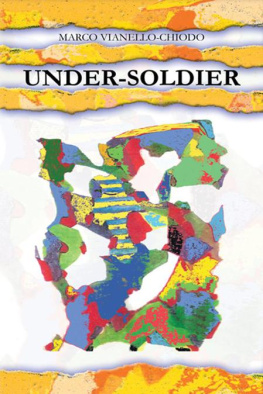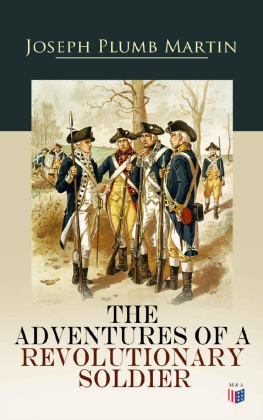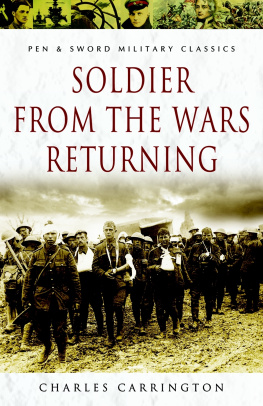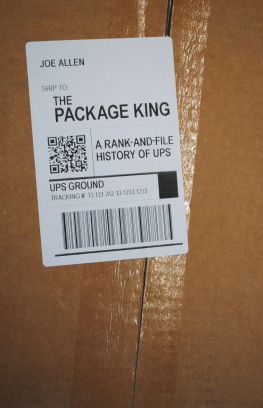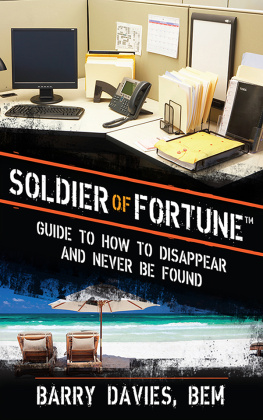Under-Soldier
Marco Vianello-Chiodo

AuthorHouse
1663 Liberty Drive
Bloomington, IN 47403
www.authorhouse.com
Phone: 1-800-839-8640
2012 by Marco Vianello-Chiodo. All rights reserved.
No part of this book may be reproduced, stored in a retrieval system, or transmitted by any means without the written permission of the author.
Published by AuthorHouse 11/20/2012
ISBN: 978-1-4772-4739-6 (sc)
ISBN: 978-1-4772-4740-2 (e)
Any people depicted in stock imagery provided by Thinkstock are models,
and such images are being used for illustrative purposes only.
Certain stock imagery Thinkstock.
Because of the dynamic nature of the Internet, any web addresses or links contained in this book may have changed since publication and may no longer be valid. The views expressed in this work are solely those of the author and do not necessarily reflect the views of the publisher, and the publisher hereby disclaims any responsibility for them.
CONTENTS
The idea of this storytitle includedcame to me some time ago during the presentation of the book Italiani si diventa, by the Italian journalist Beppe Severgnini, at the Italian Cultural Institute in London. If Severgnini can write about his life, I said to myself, perhaps I can as well. Probably he does it better, I also said to myself, but it doesnt matterIll never find a publisher. At least two people, however, will read the manuscript: my daughter Nathalie and my wife Angelika, because they love me. My daughter will find many things that she did not know, and my wife many things that she knew already. This story is first and foremost dedicated to them.
Even if dedicating a work to too many people is not done, I nonetheless dedicate this story to some other persons:
-to my father, because he would have written it better than I;
-to my mother, who taught me not to be afraid of important people (even they do poopoo every morning);
-to the old lady of Grenoble (I cant identify her any more) who, almost thirty-five years ago, said about me il nest pas fier, he is not proud, perhaps the biggest compliment I have ever received;
-to Boutros Boutros-Ghali who confirmed to me that hubris destroys the powerful;
-to Varindra Tarzie Vittachi from whom I have learned that everything is about something else;
-to Beppe Severgnini, even if he will never read it,
-and, of course, to Benedetta Bini who invited me to the Cultural Institute: if I had not gone there I may never have had the idea of writing thisand I hope she will forgive me.
P.S. A special thanks to Angelika, to whom I read this foreword even before starting to write. Great! she said (shes German but we speak English to one another: a neutral language causes fewer misunderstandings), at last Ill know all the things which are inside you, and that you have always hidden from me during all these years; and then you will not have to go to a psychoanalyst. Considering the cost of psychoanalysts, even if I dont find a publisher and make no money, I will at least have saved a small fortune.
CHAPTER I
I was born in Venice, at 4.45 p.m. on the 21 st of March, 1932, in my mothers bed (respectable people were not born in hospitals in those days), in a nice house on the Grand Canal, at Rialto. I tell the day and the hour because I ended up being born just inside the sign of Aries. It took my mother 48 hours to deliver me, and this means that if it had taken her less I would have been born under the sign of Pisces. However they tell me that I have the stubbornness of Aries, and since nobody speaks of the stubbornness of Pisces, so perhaps it was written in the stars.
All the members of my family wanted me to be called after them. My father said yes to everybody and then called me Marco, which is the name he wanted. Then, to keep his promise, he called me also Emanuele, Antonio, Arturo, Domenico, Ettore, Marcello- and Maria.
My fathers name was Mario Vianello called Chiodo . All the Vianellos have a nickname, because they come from the small island of Pellestrina, between the Lido and Chioggia, where there were only four familiesVianello, Busetto, Scarpa and Zennaro.
Thus, everybody had (and has) nicknames, in order to tell one from the other. It seems that in ancient times Vianello was Viacielo, road to the sky; and in fact our coat-of-arms has a ladder resting on a wall, and three stars on top. I never knew why we were called Chiodo. My great-great-great-grandfather Domenico was Gastaldo dellArte dei Burchieri (I know this from the documents of the Magistrate of the Waters who, in the year 1792, had denounced him because two of his boats, a burchio and a burchiellathat is two crafts of middle sizeunload rubble into the rio di Santa Maria Maggiore; which tells us that this kind of thing happened even in those days), and had come to live in Venice in 1810. He was a naval engineer and had written a book on parchment titled The Art of NavigatingBook Made By Me Domenico Vianello Called Chiodo, which, alas, has been lost, perhaps in a move. I never found out who his ancestors were: the research on the family had been made by my aunt Mary who, being unmarried, never got permission from her parents to go and look into the archives of the parish of Pellestrina, and had to be content with what she had found in Venice. And I, too, am satisfied with what I know. Also, one of my ancestors had probably been at the battle of Lepanto of 1571 against the Turks, as boasted by Count Volpi to the Mayor of Venice, Count Marcello, whose family produced Doges as early as the fifteenth century. Butlike the ancestors of Volpimine too were rowing. All in all, I am happy to have rowed only for my own pleasure.
The mother of my father, Grandma Luisi Rambousek, was Viennese (by definition, as the Viennese know), having been born in Prague from a Bohemian family of Austro-Hungarian officers. From her I have inherited my physical height of 6 ' (two of her uncles, cavalry officers, had special horses because150 years agothey were 6 ' and 6 ' tall and were beautiful in the old photographs), and the Rambousek lip, full and sensuous. Her father, while garrisoned in Trento, had married a Ferrari girl. Grandma Luisi was, as they said in those days, weak in the chest, and had gone to Italy to look for a place with more sun than Vienna. She had gone down as far as Sicily and had then come back to the North, falling in love in Venice with my grandfather Antonio who was then considered a good match: his father (he too was called Domenico) owned the Barbarigo Palace on the Grand Canal, called della Terrazza , because it had a huge, beautiful terrace on the first floor. In Venice, Grandma Luisi, who already spoke French, learned Venetian; she never learned Italian, and in Venice she had no need for it. My father spoke Venetian at home with his parents and with his sisters, but not with me because my mother was a foreigner. What I myself learned was forgotten while learning Spanish many years later.
My mother Anna Biancheri was Ligurian, from Latte di Ventimiglia, a tiny village two miles from the French border, near the famous Hanbury Gardens of La Mortola. If she had been American, she could have said that she was a daughter of the railway, like many Californians. But she really was a daughter of the railway, because her grandfather Ettore Franco, who was from the region around Venice, had gone to Cuneo as a planning engineer of the Cuneo-Nice railway, had married Anna Civalleri (daughter of the doctor with the beautiful eyes) in Boves, had had a daughter, Corinna, at Bra and had then married her off in Ventimiglia to Arturo Biancheri, nephew of the more famous Giuseppe Biancheri who was for 26 years Speaker of the Chamber of Deputies at the beginning of the Kingdom of Italy. The Biancheris were one of the first families of Ventimiglia, owned olive groves and had become rich with the oil trade. They must have had nasty dispositions because they were nicknamed House of Austria. My great-grandfather Andrea had a hunting lodge in Latte, which was in fact a large sixteenth century tower, one of the so called Ligurian Saracen Towers, with six feet thick walls and a drawbridge; and it is in this house, re-baptised Villa Corinna from the name of my grandmother, that I passed all the summers of my infancy and first youth.
Next page
